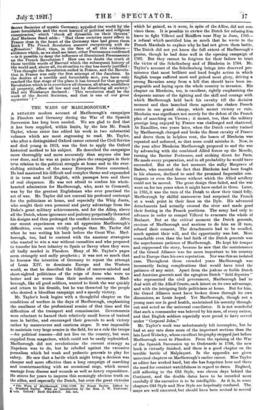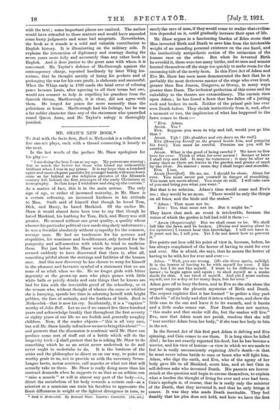THE WARS OF MARLBOROUGH.*
A DETAILED modern account of Marlborough's campaigns in Flanders and Germany during the War of the Spanish Succession has long been needed. We are glad to find that it has been supplied, within limits, by the late Mr. Frank Taylor-, whose sister has edited his work in two substantial volumes which are most engrossing to read. Mr. Taylor, who after a distinguished Oxford career entered the Civil Service and died young in 1913, was the first to apply the Oxford historical method to his subject. He described the campaigns more thoroughly and more accurately than anyone else has ever done, and he was at Pains to place the campaigns in their
trot: relation to the political. struggle at home and to the ever- shifting attitudes of. the, many European States concerned. He had mastered his difficult and complex theme and expounded it in terse and lucid English, with passages here and there of real eloquence. He was not afraid to confess his whole- hearted admiration for Marlborough, who, next to Cromwell, was by far the greatest Englishman who ever practised the art of war. Mr. Taylor did not conceal his profound contempt for the politicians at home, and especially the Whig Junta, who sought their own personal and party advantage from the Duke's great military achievements, and for the Alike, above all the Dutch, whose ignorance and jealousy perpetually thwarted his designs and thus prolonged the conffict interminably. Alter our recent experiences we can all appreciate Marlborough's difficulties, even more vividly perhaps than Mr. Taylor did when he was writing hit book before the Great War. Marl- borough, too, had to contend with the amateur strategists who wanted to win a war without casualties and who proposed to transfer his best infantry to Spain or Savoy when they were all badly needed in Flanders. Marty of Mr. Taylor's pages seem strangely and sadly prophetic ; it was not so much that he foresaw the intention of Germany to repeat the attempt
of Louis XIV. to dominate Europe and the Western world, as that he described the follies of narrow-minded and short-sighted politicians of the reign of Anne who were no better and no worse than their modern successors. Marl- borough, like all good soldiers, wanted to finish the war quickly and return to his fireside, but he was thwarted by the people who desired a bloodless campaign and a speedy victory.
Mr. Taylor's book begins with a thoughtful chapter on the conditions of warfare in the day's of Marlborough, emphasizing the smallness of the professional armies of that time and the difficulties of the transport and commissariat. Governments were reluctant to hazard their relatively small forces of trained men in battles, and encouraged their generals to seek victory rather by manoeuvres and cautious sieges. It was impossible to maintain very large armies in the field, for as a rule the troops —for political reasons—did not live on the country, but were supplied from magazines, which could not be easily replenished.
Marlborough did not revolutionize the current strategy as Napoleon was to do, but he rebelled against the excessive
formalism which led weak and pedantic generals to play for safety. He saw that a battle which might bring a decision was cheaper and more effective than a long campaign of marching and countermarching with an occasional siege, which meant wastage from disease and wounds as well as heavy expenditure. He strove for years to impress this seemingly obvious truth on the allies, and especially the Dutch, but even the great victories
• The Wars of Marlborough, 1702-1709. By Frank Taylor. Edited by G. Winifred Taylor. With an Introduction by 'the Hon. J. W. Foticecne. 2 vole. Oxford: Basil Blackwell. Ns. net.
. ,
which he gained, is it were, in spite of the Allies, did not con- vince them. It is possible to excuse the Dutch for refusing him leave to fight Villeroi and' Ikinfilets near Huy in June, 1703- a' refusal which mortified him- So much that he wrote to the French Marshals to explain why he had not given them battle, The Dutch did not yet know the full extent of Marlborough's genius, though he had done well in the opening campaign of 1702. But they cannot be forgiven for their failure to trust the ;actor of the Sehellenberg and of Blenheim in 1704. Mr. Taylor's account of the Sehellenberg brings into deserved pro- minence that most brilliant and hard fought action in which English troops suffered most and gained most glory, driving a strong Bavarian army from a hill that should have been im- pregnable and laying open the whole country to invasion. His chapter on Blenheim, too, is excellent, rightly emphasizing the desperate nature of the fighting and the skill and courage with which Marlborough held back his cavalry till the decisive moment and then launched them against the shaken French centre in one grand charge, which meant victory or ruin. Blenheim was significant 'not merely for the defeat of the French plan of marching on Vienna ; it meant, too, that the military prestige long enjoyed by France was challenged and ehattered,, At Ramillies, two years later, when the Dutch cavalry trained by Marlborough charged and broke the finest cavalry of France and drove them in helpless rout, the lesson of Blenheim was repeated and enforced, so that none could mistake it. Now, in the year after Blenheim Marlborough proposed to end- the war by advancing with the conibined Allied forces up the Moselle, turning the Barrier Fortresses, and striking direct for Paris. He made every preparation, and in all probability he would have succeeded. But at the last moment the sulky Margrave of Baden, who resented the fact that Blenheim had been fought in his absence, declined to send the promised Imperialist con- tingents or even the horses without which the Allied artillery could not be moved. The great design thus failed, and the war went on for ten years when it might have ended in three. Later, in 1705, it was the turn of the Dutch to show their timid folly. Marlborough by skilful manoeuvre had surprised the French at a weak point in their lines on the Dyle. His advanced detachments had actually crossed the river and made good their footing in the French positions. The army had only to advance in order to compel Villeroi to evacuate the whole ni Brabant. But at the critical moment the Dutch generals, envious of Marlborough and anxious to do him an ill turn, refused their consent. The detachments had to be recalled, much against their will, and the opportunity was lost. More remarkable even than the bad faith of the Dutch generals was the superhuman patience of Marlborough. He kept his temper and suppressed the story, because he saw that the maintenance of the Grand Alliance was far more important to his country and to Europe than his own reputation. Nor was this an isolated case. Throughout those crowded years Marlborough was incessantly facing complications that would have tried the patience of any saint. Apart from the jealous or feeble Dutch and Austrian generals and the egregious Dutch "field deputies" who represented the civil government, Marlborough had to deal with all the Allied Courts, each intent on its own advantage, and with the intriguing little politicians at home. But for him, the Grand Alliance must have broken down through its own dissensions, as Louis hoped. Yet Marlborough, though not a young man nor in good health, maintained his serenity through- out and acted as the universal conciliator. It is not wonderful that such a commander was beloved by his men, of every nation, and that English soldiers especially were Proud to have served under "Corporal John."
Mr. Taylor's work was unfortunately left incomplete, but he had at any rate done more of the important sections than the late Lord Wolseley, whose excellent biography stopped just before
Marlborough went to Flanders. From the 'opening of the War of the Spanish Succession up to Oudenarde in 1708, the' new book is virtually finished, and there is a good chapter on the terrible battle of Malplaquet. In the appendix are given unrevised chapters on Marlborough's earlier career. Miss Taylor as editor has worked hard, but she has forgotten here and there the need for constant watchfulness in regard to dates. England, still adhering to the Old Style, was eleven days behind the. Continent, and the double 'dates have to be recorded most carefully if the narrative is to be intelligible. As it is, in some chapters Old Style and New Style are hopelessly confused. The, maps are well executed, but should have been revised to accord
with the text ; some important places are omitted. The author would have attended to these matters and would have amended some hasty judgments and some bad misprints. Nevertheless, the book as it stands is a solid and valuable contribution to English history. It is illuminating on the military side. It explains the interaction of diplomacy and strategy during the seven years more fully and accurately than any other book in English. And it does justice to the great man with whom it is concerned. Mr. Taylor's defence of Marlborough against the contemporary charge, repeated heedlessly by later Whig his- torians, that he thought mainly of lining his pockets and of prolonging the war for his own profit, is elaborate and successfuL When the Whigs early in 1709 made the fatal error of refusing peace because Louis, after agreeing to all their terms but one, would not consent to help in expelling his grandson from the Spanish throne, Marlborough, it is clear, did not agree with them. He longed for peace far more earnestly than the politicians at home. Marlborough had his failings, but he was a far nobler character than any of the statesmen who quarrelled round Queen Anne, and Mr. Taylor's eulogy is thoroughly justified.











































 Previous page
Previous page